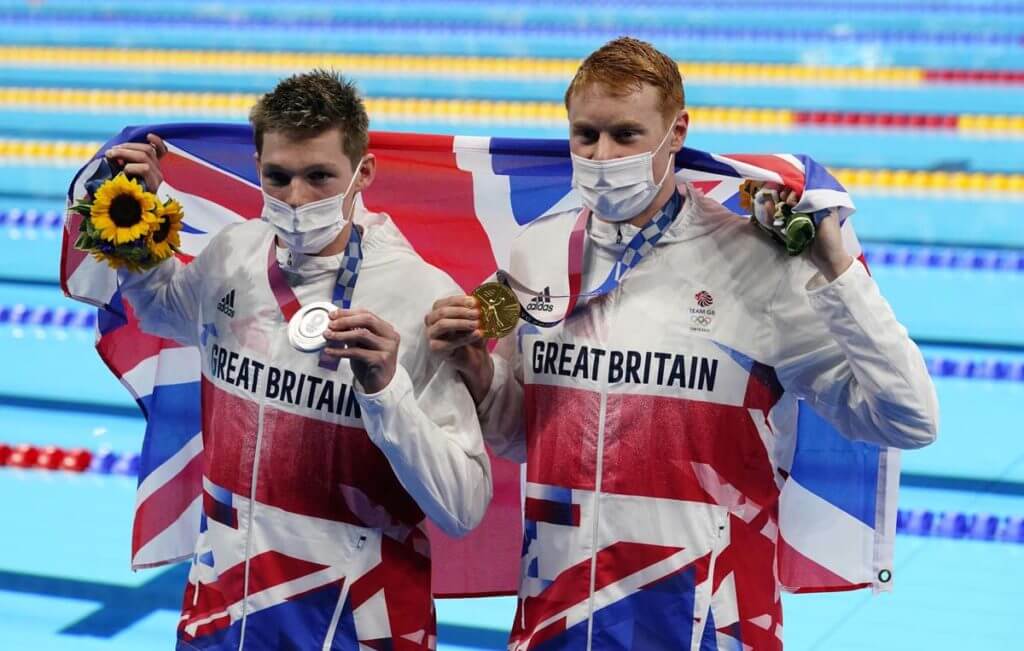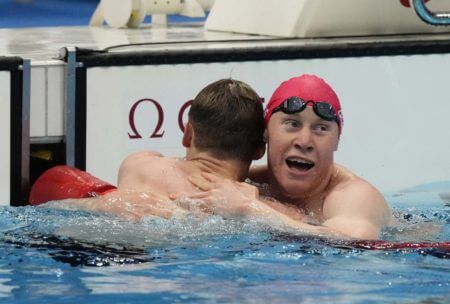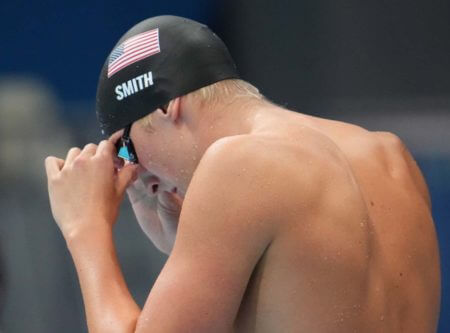Olympics: After Historic Start in Tokyo Pool, Great Britain Destined for 800 Free Relay Gold

Editorial content for the 2021 Tokyo Olympic Games coverage is sponsored by GMX7.
See full event coverage. Follow GMX7 on Instagram at @GMX7training #gmx7

Olympics: After Historic Start in Tokyo Pool, Great Britain Destined for 800 Free Relay Gold
Off the final turn in the men’s 200 freestyle final, Great Britain’s Tom Dean and Duncan Scott asserted themselves, getting past early leader Hwang Sun-Woo of South Korea and beginning to pull away. The only remaining question was which of those two would win Olympic gold and who would take silver. While Scott looked to be narrowly ahead coming down the stretch, Dean got his hand to the wall 0.04 ahead, 1:44.22 to 1:44.26.
The finish was historic. Great Britain had won an Olympic gold medal in men’s freestyle for the first time in 113 years. No, that is not a typo. In fact, every British men’s gold medal in swimming since the 1908 Olympics in London had come in breaststroke: David Wilkie in the 200 breast in 1976, Duncan Goodhew in the 100 breast in 1980, Adrian Moorhouse in the 100 breast in 1988 and, of course, Adam Peaty in the 100 breast in both 2016 and 2021. The result was Britain’s first 1-2 finish in any swimming event since the 1908 Olympics, and combined with Peaty’s win one day earlier, it was the first time Britain had won multiple golds in men’s swimming in any Olympics since – you guessed it – 1908.

Tom Dean and Duncan Scott embrace after they finished 1-2 in the 200 free at the Olympics — Photo Courtesy: Rob Schumacher/USA Today Sports
Britain’s women are also off to a solid start to the Tokyo Games, with Kathleen Dawson already fifth in the 100 back final and Abbie Wood seeded second for Wednesday’s 200 IM final. Wood and Molly Renshaw are both medal contenders in the upcoming 200 breaststroke. But the men are hot in pursuit of yet another gold and a particularly special one: the country’s first relay gold medal since, of course, 1908.
It’s only natural that the country that finishes 1-2 in the individual 200 free would be favored for 800 free relay gold, and the Brits have a heck of a squad. Beyond Dean and Scott, they will utilize James Guy, who actually was the 2015 world champion in the 200 free and has a history of splitting 1:43s on this relay. Guy had the fastest split on Britain’s top-seeded prelims relay at 1:44.66. The last spot on the team will be either Matt Richards, who took third at Britain’s Olympic Trials in 1:45.77, or Calum Jarvis, who split 1:45.53 in prelims.
Before we get to any of the other medal contenders, here is the composite, using Dean and Scott’s flat-start times (seven tenths were subtracted from Scott’s time to account for a relay exchange) and Guy and Jarvis’ splits from prelims.
Great Britain: Dean 1:44.22 + Scott 1:43.56 + Guy 1:44.66 + Jarvis 1:45.53 = 6:57.97
It’s worth noting that the world record in the event is 6:58.55, set by an American team that included Michael Phelps and Ryan Lochte at the supersuit World Championships of 2009. That record is in imminent danger in Wednesday morning’s final. That would be an amazing cap to a one of the best three-day stretches in British Swimming history – and it may only be more special if Wood gets on the podium in the 200 IM, earning the British women a swimming medal for the fourth straight Olympics.
The Race for Silver
Britain will win this gold medal, but silver and bronze? That’s much more difficult to discern. Four teams will be in the mix for those spots, the countries seeded second through fifth in the final: Australia, Italy, the Russian Olympic Committee and the United States.
Australia, the reigning world champions in this relay, will add defending 100 free Olympic gold medalist Kyle Chalmers and 200 freestyle Tokyo finalist Tommy Neill to their finals team. Elijah Winnington will likely come off the relay after a disappointing Olympics so far to allow Alexander Graham and Zac Incerti, both 1:45s in prelims, to stay on.
Meanwhile, no country has overperformed more in relays in Tokyo than Italy. No one expected the Italians to contend for a medal in the 400 free relay, but they took silver. Stefano Ballo was a semifinalist in the 200 free in Tokyo, but he sat out prelims, leaving an Italian team with no swimmer under 1:47 so far in 2021. Then Matteo Ciampi and Filippo Megli split 1:45s, and Marco de Tullio clocked in at 1:46-mid. Combine that with Ballo’s best time here (1:45.80), and you have a solid relay, although their ceiling is definitely lower than the other competitors.
Russia is a complete wildcard here. Martin Malyutin was the European champion in the 200 free in May, but he has not broken 1:45 in the 200 free at the Olympics and he missed the 400 free final entirely. Aleksandr Shchegolev has only raced once in Tokyo, and that was when he split a poor 49.13 on the anchor leg of the 400 free relay in prelims. We’re giving him his season-best time of 1:45.82 here but without much confidence. Ivan Girev and Mikhail Vekovishchev both had solid splits on the qualifying relay and will likely return, although Vekovishchev might sub out for Evgeny Rylov, the 100 back gold medalist who has been a 1:46.51 from a flat start this year.

Kieran Smith will be added to the U.S. men’s 800 free relay squad for the final — Photo Courtesy: Robert Hanashiro/USA Today Sports
Finally, the United States can count on Kieran Smith, sixth in the 200 free final, to deliver a great leg after improving his best time to 1:45.07 in the semifinals. Townley Haas was not great in the semis, but he has been as quick as 1:45.66 this year, and Haas always performs on this relay. He split 1:44.14 in the Rio final, the fastest of anyone in the field. But who else will join this duo in the final? Likely Drew Kibler after he led off in 1:46.12, just off his lifetime best. Maybe Andrew Seliskar – his split of 1:46.17 was not great, but he should be capable of faster if he does not again go out in 49.86 and fade hard on the last lap.
Caeleb Dressel? He is absolutely an option here. Dressel’s best time this year is 1:46.63 (set in prelims at Olympic Trials), and is he capable of splitting 1:44 on this relay? Without question. But is it worth having Dressel expend the energy for a 200 freestyle when he will have the 100 free final coming up 24 hours later and gold is likely out of reach? That’s the question Dave Durden and the U.S. coaching staff (including Gregg Troy, Dressel’s personal coach) will have to ask themselves.
Here are the composite relays for the remaining competitors, using best times from Tokyo or splits from the prelim relay or, in some cases, season-best times. Five to seven tenths were subtracted from all but the first swimmer to account for enough swimmers performing flying starts.
Australia: Graham 1:45.72 + Incerti 1:45.58 + Neill 1:45.04 + Chalmers 1:44.78 = 7:01.12
Russian Olympic Committee: Malyutin 1:44.79 + Shchegolev 1:45.12 + Girev 1:45.71 + Vekovishchev 1:46.11 = 7:01.73
United States: Smith 1:45.07 + Haas 1:45.16 + Kibler 1:45.72 + Seliskar 1:46.21 = 7:02.16
Italy: Ballo 1:45.80 + Ciampi 1:45.64 + de Tullio 1:46.78 + Megli 1:45.63 = 7:03.85
Even though Italy will be seeded third for the final, it would be a stretch for that squad to hold on to a medal position with the adds that Australia, the ROC and the U.S. still need to make. But when comparing the first three teams, it just depends on who shows up and performs on the day. Can Chalmers dip well into the 1:44 range to elevate his squad? For Russia, Shchegolev is an enormous question mark, and that team definitely needs Malyutin to be at his best. And of course, will the Americans decide to utilize the world’s best swimmer to boost their chances?
But this definitely will not be a fourth straight gold medal for the United States in the 800 free relay at the Olympics. Phelps and Lochte were a part of all four wins, and while the 2004 victory over Australia came down to the wire, none of the others were competitive races.
This year’s final won’t be close, either – but instead of the Star Spangled Banner, it will be God Save the Queen ringing through the aquatic center in Tokyo for a third straight day as Great Britain continues its best Olympics in the pool in more than a century.





Zach Apple?